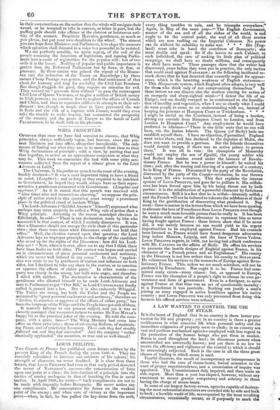A LAW WANTED TO CONTROL THE USE OF STEAM.
IT is the boast of England that in no country is there better pro- tection for life and property ; yet in no country is there a greater recklessness in what concerns life when personal safety and the immediate exigencies of property seem to clash ; in no country are vast and perilous mechanical agencies employed with less regard to the protection of the human beings who put them in motion. Steam is used throughout the land ; its disastrous powers when i uncontrolled are universally known ; and yet there is no law to secure the efficiency and vigilance of the control to which it should be unceasingly subjected. Such is the case in all the three great classes of trading in which steam is used. Fearful disasters, the result of incompetency or intemperance in those who had the care of steam-boats, forced attention to the want of proper superintendence, and a commission of inquiry was appointed. The Commissioners duly inquired, and then made an able report. More than a year has elapsed, however, without any enactment to secure greater competency and sobriety in those having the charge of steam-boats.
In some of our largest factory-towns, agencies capable of destroy- ing the most substantial structures are crowded side by side and back to back ; a horrible waste of life, accompanied by the most revolting circumstances, occasionally _ occurs, as if purposely to mark the
want of some controlling authority ; and yet hundreds of thou- sands still remain exposed to the danger, without a word in the statute-book to vindicate in their behalf the rights of humanity,
To say that railroad-travelling and suicide are convertible terms, is becoming hardly an hyperbole. The weekly papers still record "frightful accidents," " shocking and fatal collisions," by the half-dozen ; the daily papers have been loaded with reports of coroner's inquests into the deaths which have been dealt out wholesale—destruction " by steam"; and yet lawmakers look on— even partake in the destruction—nay, even lead the way, in the person of no less an officer than a Chancellor of the Exchequer; and it was not till late in the last session that inquiry was made as to the possibility of applying a remedy to the evil. We are accustomed to ridicule the recklessness with which our rougher brethren across the Atlantic hazard the lives of their countrymen in contact with steatn, while we have allowed them to get the start of us in devising a law to meet the new want in society. It is the remark of an American newspaper, that whereas the disasters which occur there are almost invariably owing to pure accident, or to defective ma- chinery—arising from the vast space of the country to be traversed compared with the means of its capitalists—in England, where we pride ourselves on the completeness of our arrangements, the mischief invariably originates in the grossest negligence, requiring nothing but the commonest attention to prevent it altogether. The four or five accidents which have most recently occurred illus- trate this position : in one case, on the Midland Counties Railway, the disaster appears to have been caused by two men who were sent back along a line of railroad to apprize the attendants of an approaching train of an obstruction on the road. They totally ne- glected their orders : rather than walk a mile or so, they left life and property to the chance of the destruction which ensued. In a second accident on the same line of railway, some blundering, not yet explained, allowed two sets of carriages to jostle one another while actually in the hands of the servants ; and broken bones and bruises were the slight consequences. In a third, on the Blackwall road, the sufferer, who was killed in a shocking manner, was walk- ing along in the way of a danger with which he was familiar. In a fourth, on the Leeds and Manchester line, one train overran an- other which preceded it ; and the inferiority of the engine of the foremost train is set forth as if in excuse for the fault. In a fifth, on the Slamannan and Glasgow line, a train, going at a very rapid pace to make up for lost time, was thrown off the line, nobody knew how. In all these cases, probably, adequate arrangements might have rendered such " accidents" impossible.
There must be causes for this monstrous indifference to human safety ; and they do not appear obscure, nor difficult of prevention. One predisposing cause to carelessness is no doubt the very potency of the agent which destroys : the ease with which steam performs its function, and the very smoothness of the railroad, lull men, by the force of association, into a state of heedless repose : relieved of trouble of one sort, they look for no trouble at all, and thus are con- tent to let their fellow-creatures be crushed to atoms, or blown and scorched to a blackened cinder, for want of turning a lantern or filling up a steam-gauge of which the mercury has been blown out. Frequent as accidents are, in the vast majority of cases, and in the daily experience of most men whose business it is to deal with steam, there is impunity for negligence. The mercury may often be blown out of the steam-guage, and the engineer " never know any harm to come of it "; the water may not often "take it into its head" just then to run low and blow up the boiler with superabun- dant steam : but it may, and the poor heedless engineer may be blown to a shapeless and mutilated mass, with nothing in his miserable suffer- ing to console others for the fault which deprives them of husbands or parents. " Seeing is believing," however : daily experience of im- punity, and the remoteness and uncertainty of the danger, breed a habit of heedlessness. It is plain that the unhappy man who caused his own death on the Birmingham Railway lately, by habitual disre- gard of signals and habitual recklessness of speed, had no adequate motive to compel attention and caution on his part : the conse- quences of his acts were so remote and uncertain, that, horrible as they were, they were not efficient to counteract, in an untaught mind, the daily experience of impunity. Here then is the want— the supply of some motive to attention and caution. Means should be devised to force upon those having the direction of enterprises in which steam-power is employed, whether in ships, factories, or railroads, that decent regard to the lives of their fellow-creatures which it appears their own good feeling cannot secure, in the selec- tion of proper persons to overlook and manage the gigantic power now intrusted to brute ignorance. But, with the best selection, a controlling authority should be felt each instant by every band en- gaged in the management of steam : if possible destruction to life is not sufficient to frighten an engineer from neglect and recklessness, something must be found out that will be sufficient. Some severe and clearly-defined punishment—a hard term of imprisonment, or a heavy pecuniary mulct—is of that nature ; a penalty not merely upon the completion of the remote and possible catastrophe, but upon the acts which are the first to lead to it ; a penalty, for instance, upon loading the safety-valve of an engine, or upon neglect- ing to display or to obey a signal. And the penalty should not merely be of that kind which would be, though a sacrifice, an easy sacrifice, to the offender : it should be such as to deter— to frighten him from conduct from which the chance of doing mur- der will not frighten him: it should be a penalty so frightful, and so certain, that the thought of it would operate each moment of his occupation. That the public feel some such check to be want- ing, is shown by the heavy deodands which juries place upon the inanimate instruments of fatal accidents. That, however, is but a clumsy, uncertain kind of punishment ; with the disadvantage of being liable to contest, and of possessing, moreover, less moral influence because it is enforced by a kind of straining of the law. And it can only act when the final and remote catastrophe has taken place. Six months at the tread-mill, or a certain penalty of 1001. on the perpetration of an initial offence, such as those men- tioned already, would be more effectual than a deodand of 1,000/. on the final disaster. It is to be hoped that the lawmakers of the land will not again separate without performing so very needful a duty as making a wise law to regulate the use of steam.



























 Previous page
Previous page